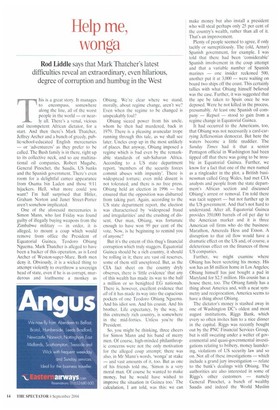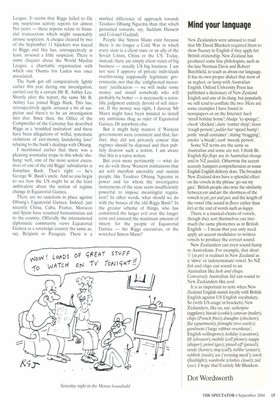Help me, wonga
Rod Liddle says that Mark 'Thatcher's latest difficulties reveal an extraordinary, even hilarious, degree of corruption and humbug in the West This is a great story. It manages to encompass, somewhere along the line, all of the worst people in the world — or nearly all. There's a venal, vicious and incompetent African dictator, for a start. And then there's Mark Thatcher, Jeffrey Archer and a bunch of greedy, public-school-educated English mercenaries — or 'adventurers' as they prefer to be called. The Bush family is in there, right up to its collective neck, and so are multinational oil companies, Robert Mugabe, General Pinochet, the Saudis, US banks and the Spanish government. There's even room for a delightful cameo appearance from Osama bin Laden and those 9/11 hijackers. Hell, what more could you want? I'm half surprised that Hitter, Graham Norton and Janet Street-Porter aren't somehow implicated.
One of the aforesaid mercenaries is Simon Mann, who last Friday was found guilty of illegally buying weapons from the Zimbabwe military — in order, it is alleged, to mount a coup which would remove from office the President of Equatorial Guinea, Teodoro Obiang Nguema. Mark Thatcher is alleged to have been a backer of this operation, as is Lord Archer of Weston-super-Mare. Both men deny it. Obviously, it is a wicked thing to attempt violently to overthrow a sovereign head of state, even if he is as corrupt, murderous and loathsome a monkey as Obiang. We're clear where we stand, morally, about regime change, aren't we? Even when the regime to be changed is unspeakably foul?
Obiang siezed power from his uncle, whom he then had murdered, back in 1979. There is a pleasing avuncular trope running through this tale, as we shall see later. Uncles crop up in the most unlikely of places. But anyway. Obiang imposed a regime which is bad even by the remarkable standards of sub-Saharan Africa. According to a US state department report, 'members of the security forces commit abuses with impunity'. There is widespread torture; even mild dissent is not tolerated; and there is no free press. Obiang held an election in 1996 — but ensured that the opposition was disbarred from taking part. Again, according to the US state department report, the election was characterised by 'widespread fraud and irregularities' and the crushing of dissent. Our man, Obiang, was fortunate enough to have won 99 per cent of the vote. Now, is he beginning to remind you of anyone?
But it's the extent of this thug's financial corruption which truly staggers. Equatorial Guinea should be a rich country, it should be rolling in it; there are vast oil reserves, some of them still unexplored. But, as the CIA fact sheet on the country dryly observes, there is 'little evidence' that any of this wealth has made its way to the half a million or so benighted EG nationals. There is, however, excellent evidence that all of it has made its way into the capacious pockets of one Teodoro Obiang Nguema. And his idiot son. And his cousin. And his brother. Life expectancy, by the way, in this extremely rich country, is somewhere in the mid-forties. Unless you're the President.
So, you might be thinking, three cheers for Simon Mann and his band of merry men. Of course, high-minded philanthropic concerns were not the only motivation for the alleged coup attempt; there was also. in Mr Mann's words, `wonga' at stake — and vast amounts of it, too. But as one of his friends told me, 'Simon is a very moral man. Of course he wanted to make money, but he would have wished to improve the situation in Guinea too.' The calculation, I am told, was this: we can
make money but also install a president who will steal perhaps only 25 per cent of the country's wealth, rather than all of it. That's an improvement.
Plenty of people seemed to agree, if only tacitly or surreptitiously. The (old, Aznar) Spanish government, for example. I was told that there had been 'considerable' Spanish involvement in the coup attempt and that a variable number of Spanish marines — one insider reckoned 500, another put it at 3,000 — were waiting on board two ships off the coast. This certainly tallies with what Obiang himself believed was the case. Further, it was suggested that the ape be taken to Spain once he was deposed. Were he not killed in the process, presumably. At least one Spanish oil company — Repsol — stood to gain from a regime change in Equatorial Guinea.
It had occurred to the Americans, too, that Obiang was not necessarily a card-carrying Jeffersonian democrat. But here the waters become a little muddier. The Sunday Times had it that a senior Pentagon official in Washington had been tipped off that there was going to be trouble in Equatorial Guinea. Further, we know for a fact that one of the men named as a ringleader in the plot, a British businessman called Greg Wales, had met CIA analysts and people from the state department's African section and discussed Obiang's arrest or removal. I'm told there was tacit support — but not further up in the US government. And that's not hard to understand. After all, Equatorial Guinea provides 350,000 barrels of oil per day to the American market and it is three American oil firms who do the business: Marathon, Amereda Hess and Exxon. A disruption to that oil flow would have a dramatic effect on the US and, of course, a deleterious effect on the finances of those US companies.
Further, we might examine where Obiang has been secreting his money. His son has an $8 million home in Los Angeles; Obiang himself has just bought a pad in Maryland for $2.5 million. His cousin has a house there, too. The Obiang family has a thing about America and, with a neat symmetry and reciprocation, America seems to have a thing about Obiang.
The dictator's money is stashed away in one of Washington DC's oldest and most august institutions, Riggs Bank, which every so often invites him to a nice dinner in the capital. Riggs was recently bought out by the PNC Financial Services Group, but is still sweating under a welter of governmental and quasi-governmental investigations relating to bribery, money laundering, violations of US security law and so on. Not all of these investigations — which include a grand jury investigation — relate to the bank's dealings with Obiang. The authorities are also interested in some of Riggs's other customers — namely General Pinochet, a bunch of wealthy Saudis and indeed the World Muslim League. It seems that Riggs failed to file any suspicious activity reports for almost five years — these reports relate to financial transactions which might reasonably arouse suspicion. A cheque cleared by two of the September 11 hijackers was traced to Riggs and this has, retrospectively at least, aroused a little suspicion. There is some disquiet about the World Muslim League, a charitable organisation with which one Osama bin Laden was once associated.
The bank got off comparatively lightly earlier this year during one investigation, carried out by a certain Mr R. Ashley Lee. Shortly after the report, the same Mr R. Ashley Lee joined Riggs Bank. This has, retrospectively again, aroused a bit of suspicion and there's to be an investigation into that. Since then, the Office of the Comptroller of the Currency has described Riggs as a 'troubled institution' and there have been allegations of 'wilful, systematic violations of anti-money laundering laws' relating to the bank's dealings with Obiang.
I mentioned earlier that there was a pleasing avuncular trope to this whole shebang: well, one of the most senior executives of one of the old Riggs' subsidiaries is Jonathan Bush, That's right — he's George W. Bush's uncle. And so you begin to see how the US might be at the least ambivalent about the notion of regime change in Equatorial Guinea.
There are no sanctions in place against Obiang's Equatorial Guinea. Indeed, just recently China, Cuba, France, Morocco and Spain have resumed humanitarian aid to the country. Officially the international diplomatic community views Equatorial Guinea as a sovereign country the same as, say, Belgium or Paraguay. There is a marked difference of approach towards Teodoro Obiang Nguema than that which pertained towards, say, Saddam Hussein and Colonel Gaddafi.
People like Simon Mann exist because there is no longer a Cold War in which every state is a client state or an ally of the Soviet Union, China or the US. Today, instead, there are simply client states of big business — usually US big business. I am not sure I approve of private individuals overthrowing supposedly legitimate governments, nor that the 'enlightened mercenary' justification — we will make some money and install somebody who will probably be better — is necessarily a scientific judgment entirely devoid of self interest. If the money was right, I daresay Mr Mann might have been minded to install any ambitious thug as ruler of Equatorial Guinea, Or anywhere else.
But it might help matters if Western governments were consistent and that, further, they did not privately concur that regimes should be deposed and then publicly disavow such a notion. I am aware that this is a naive notion.
But even more pertinently — what do we do with those Western institutions that act with manifest amorality and sustain people like Teodoro Obiang Nguema in power and for whom the investigative instruments of the state seem insufficiently powerful to impose meaningful regulation? In other words, what should we do with the bosses of the old Riggs Bank? In the greater scheme of things, who has committed the larger evil over the longer term and ensured the maximum amount of misery for the people of Equatorial Guinea — the Riggs executives, or the wretched Simon Mann?



































































 Previous page
Previous page